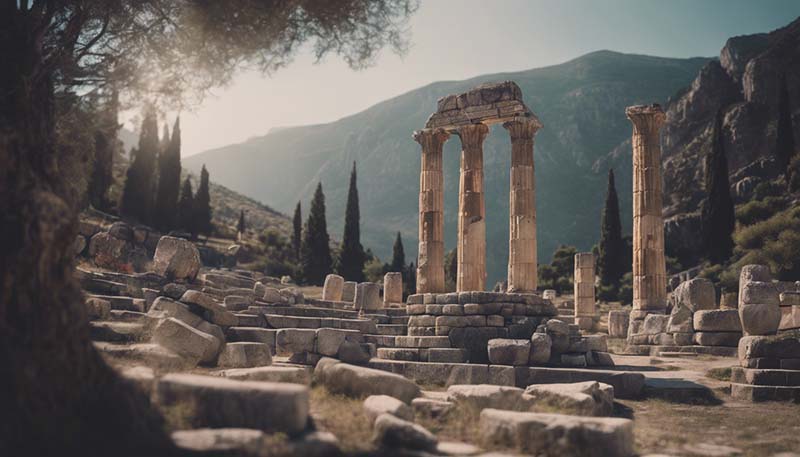The Oracle of Delphi is one of the most significant and mysterious religious sites in ancient Greece. Located on the south slope of Mount Parnassus, Delphi was considered the center of the world and attracted visitors from all over the ancient world. The site was famous for its prophecies and was a place of pilgrimage, worship, and consultation for centuries.
## Introduction
Delphi was more than just a religious site; it was a symbol of spiritual and intellectual authority. The ancient Greeks believed that Delphi was the \"navel of the earth,\" the point where heaven and earth met. The site was home to the Temple of Apollo, the Pythian Games, and the Oracle of Delphi, who was believed to be the mouthpiece of the god Apollo.
## History of Delphi
The history of Delphi dates back to the 8th century BC. The site was originally dedicated to the earth goddess Gaia, but it later became associated with Apollo, the god of light and prophecy. According to legend, Apollo killed the serpent Python, who guarded the site, and claimed it for himself. The Oracle of Delphi was established after Apollo\'s victory over the serpent, and the site became a major religious center.
## The Oracle of Delphi
The Oracle of Delphi was a priestess known as the Pythia. She was believed to be the medium through which Apollo communicated his prophecies. The Pythia would enter a trance-like state and deliver messages from Apollo in a cryptic and poetic form. These prophecies were often open to interpretation and were sought by individuals, city-states, and even foreign rulers.
The Oracle of Delphi was consulted on various matters, including war, politics, and personal affairs. Some of the most famous prophecies include those given to the Athenians before the Persian Wars and to Croesus, the king of Lydia, before his disastrous military campaign.
## The Temple of Apollo
The Temple of Apollo was the focal point of Delphi and was built in the 4th century BC. The temple was dedicated to Apollo and housed a golden statue of the god. The temple was destroyed and rebuilt several times throughout history, with the last version being constructed in the 4th century AD.

The temple was an architectural masterpiece, featuring a Doric facade and a frieze depicting scenes from the life of Apollo. The temple was also adorned with statues and offerings from various city-states and individuals, reflecting the importance of Delphi in the ancient world.
## The Pythian Games
The Pythian Games were held every four years in honor of Apollo and were one of the four major athletic competitions in ancient Greece. The games included athletic, musical, and poetic contests and were a significant cultural and religious event.
The Pythian Games were held in the Sanctuary of Athena Pronaia, which was located near the Temple of Apollo. The Sanctuary was dedicated to Athena and was an important religious site in its own right. The games were a means of promoting the worship of Apollo and Athena and were an opportunity for city-states to showcase their wealth and power.
## The Decline of Delphi
The Oracle of Delphi and the site\'s religious significance declined in the centuries following the rise of Christianity. The last recorded prophecy was delivered in 393 AD, and the site was officially closed by Emperor Theodosius I in the same year.
Despite its decline, Delphi continued to be a site of interest and pilgrimage throughout the Byzantine period. The site was rediscovered by European travelers during the 18th and 19th centuries, and archaeological excavations have been carried out since the 19th century.
## Conclusion
The Oracle of Delphi was a significant religious and cultural site in ancient Greece. Its prophecies, the Temple of Apollo, and the Pythian Games made it a center of spiritual and intellectual authority. The site\'s history and legacy continue to captivate scholars and visitors alike, and Delphi remains an important symbol of the ancient world\'s spiritual and cultural heritage.